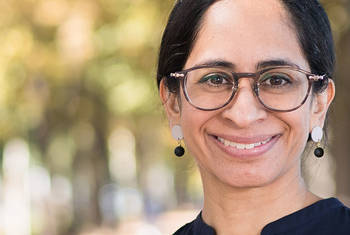Ayelet Shachar Are States Shifting Their Borders to Control Immigration?
Professor Ayelet Shacharis Director of the Max Planck Institute for the Study of Religious and Ethnic Diversity, and Professor of Law, Political Science and Global Affairs at the University of Toronto. She has previously held visiting professorships at Stanford Law School and Harvard Law School. Shachar’s main research foci include citizenship theory, immigration law and multiculturalism as well as cultural diversity, women’s rights and global inequality. Having provided consultancy expertise to the European Parliament and the World Bank, Shachar was awarded Germany’s most prestigious research award in 2019, the Gottfried Wilhelm Leibniz Prize.
Area of Research
Immigration Law
since 2015
Director
Max Planck Society (more details)
Max Planck Institute for the Study of Religious and Ethnic Diversity
2007-2015
Full Professor & Canada Research Chair in Citizenship and Multiculturalism
University of Toronto, Law, Political Science and Global Affairs (Canada)
2007-2008
Jeremiah Smith Jr. Visiting Professor
Harvard University
Harvard Law School (USA)
2006-2007
Leah Kaplan Visiting Professor in Human Rights
Stanford University
Stanford Law School (USA)
2004-2007
Associate Professor
University of Toronto, Law & Political Science (Canada)
1999-2004
Assistant Professor
University of Toronto, Faculty of Law (Canada)
1996-1998
Tutor in Law & Senior Research Fellow
Yale University
Yale Law School
1993-1994
Law Clerk to Chief Justice Aharon Barak
Supreme Court of Israel
1995-1997
LL.M.
Yale University
Yale Law Schoo
1993-1995
B.A.
Tel Aviv University
Department of Political Science
1993-1995
LL.B.
Tel Aviv University
Law Department
- American Political Science Review
- British Journal of Political Science
- Canadian Journal of Family Law
- Journal of Politics
- Perspectives on Politics
- Political Studies
- Member of the Göttingen Academy of Sciences and Humanities (since 2017)
- Fellow of the Royal Society of Canada (since 2014)
Prizes
- Gottfried Wilhelm Leibniz Prize (2019)
- American Political Science Association (APSA) Migration & Citizenship Chapter Award (2013)
- International Ethics Book Award Honorable Mention for “The Birthright Lottery” (2010)
- APSA Foundations of Political Theory Section, Best First Book Award (2002)
- Canadian Association of Law Teachers (CALT), Scholarly Paper Award (2001)
- Knesset Award for Junior Scholars of Exceptional Merit (1993)
Fellowships
- Connaught Research Fellowship in the Social Sciences (2005)
- W.M. Keck Foundation Fellowship in Legal Ethics and Professional Culture (1996-1997)
- Fulbright Fellowship (1994-1996)
- Lillian Goldman Fellowship for the Study of Women’s Rights, Yale Law School (1995-1997)
- Cecil A. Wright Foundation for Legal Scholarship Research Grant (2001-2004)
 © Maximilian Dörrbecker
© Maximilian Dörrbecker
Max Planck Society
"The Max Planck Society is Germany's most successful research organization. Since its establishment in 1948, no fewer than 18 Nobel laureates have emerged from the ranks of its scientists, putting it on a par with the best and most prestigious research institutions worldwide. The more than 15,000 publications each year in internationally renowned scientific journals are proof of the outstanding research work conducted at Max Planck Institutes – and many of those articles are among the most-cited publications in the relevant field." (Source)
Institute
Max Planck Institute for the Study of Religious and Ethnic Diversity
"This Max Planck Institute is primarily concerned with research into various forms of diversity. In today’s societies, people of varying ethnic and religious backgrounds often live side by side. The spectrum ranges from peaceful multiculturalism to bloody conflict – but when does the one occur and when the other? Through wide-ranging empirical studies and by developing theoretical concepts, the Göttingen-based Institute seeks to broaden our understanding of these issues of human coexistence. The main focus of this work is on basic research, but in some instances it extends as far as advising on political policy." (Source)
Map
Borders have been conceptualized in two main ways. The “static border” is the fixed line on a map that separates one country from another. Post 1989, the concept of the “disappearing border” came into fashion, the notion that borders and their influence onhuman mobility would become increasingly irrelevant. In this video, AYELET SHACHAR argues that though contemporary borders are not static, they have certainly not disappeared. Proposinga model of the “shifting border”and analyzing the ways in which countries like the U.S., Canada and Australia have effectively moved their territorial borders in order to control human mobility, Shachar argues that if borders are dynamic, then human rights should be equally agile. Highlighting the dramatic effects that the“shifting border” can have for those seeking asylum, Shachar’s work pinpoints the central importance that debates around immigration have for contemporary conceptions of citizenship and national sovereignty.
LT Video Publication DOI: https://doi.org/10.21036/LTPUB10879
The Shifting Border: Legal Cartographies of Migration and Mobility
- Ayelet Shachar
- Published in 2020







